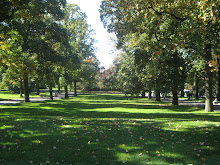
The building of Interstate 94 tore through the Rondo neighborhood in St. Paul during a time this was the norm in urban renewal. Like most interstate and expressways built, neighborhoods were bulldozed over to make sure that these new arteries could exist through the heart of our major cities. Not only does the physical structure remind long term residents of what was lost, this devastating event has cast its shadow over the building of the Central Corridor line.
The 31-year-old Carter, a former track star at Central High School, wasn't alive when the interstate tore apart Rondo. But he grew up hearing stories about the neighborhood. His great-grandfather, Mym Carter, led a jazz string band in on a horse-drawn buggy down Rondo Avenue. And Carter's grandfather owned a handful of commercial buildings that the councilman says he probably would have inherited.
Carter's own father, who lost his childhood home to the freeway project, often shared his memories of Rondo on car trips around St. Paul with his kids.
"Growing up, we'd ride I-94, and just before the Dale Street bridge, he'd say, 'You're in my bedroom -- now!'" Carter recalled. "And for those folks who lived that, and even for someone like me, who grew up hearing the stories of Rondo far before I ever knew what the letters LRT stood for, and grew up with a gut, gut feeling about how horrible a tragedy Rondo was, I think it's understandable somebody can look at [light rail] and say, 'No thanks.'"
That doesn't mean residents should resist light rail, Carter said. But there is a lesson to be learned from Rondo:
"It happened so long ago, but we're still in the shadow of Rondo," he said. "That's exactly what makes it so important that we choose our steps very carefully now.




No comments:
Post a Comment